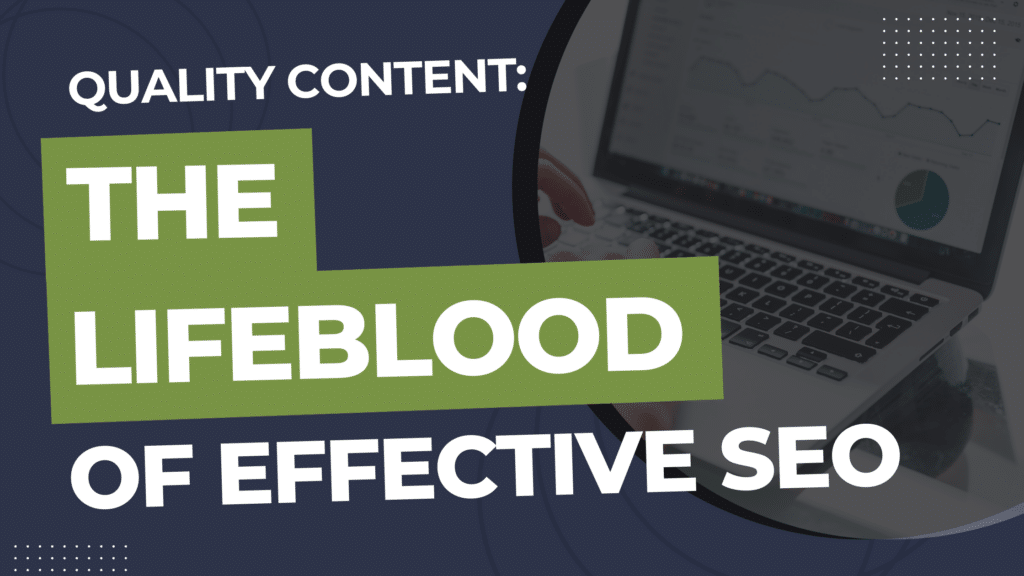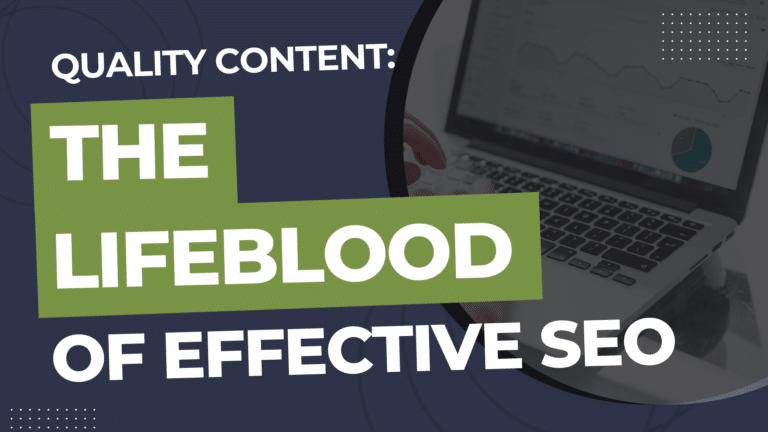Quality Content: The Lifeblood of Effective SEO
You’ve probably heard it a million times: “Content is king.” But when it comes to SEO, this statement isn’t just a cliché—it’s the absolute truth. No matter how much you optimize your site, build backlinks, or fine-tune technical details, none of it matters if your content isn’t up to par. Quality content is the heart and soul of your SEO strategy, and without it, your efforts can fall flat.
In this post, we’re going to dive into why quality content is non-negotiable, what makes content “high quality” in the eyes of both your audience and search engines, and how to create content that drives results. And yes, we’ll take a moment to poke fun at some SEO jargon along the way.
The Power of Quality Content
Let’s start with the obvious: Why is quality content so important? Well, think of content as the fuel that powers your SEO engine. Without it, you’re not going anywhere. High-quality content does more than just fill up space on your website—it attracts visitors, engages them, and keeps them coming back for more. It’s what turns casual browsers into loyal customers. And as far as search engines are concerned, quality content is what helps determine whether your site is worth ranking at the top or left to linger in the digital abyss.
Here’s a quick analogy: Imagine you’re hosting a dinner party. You’ve cleaned the house, set the table, and even put out a fancy centerpiece. But when it comes time to serve the meal, all you’ve got is a stale loaf of bread and some old cheese. Sure, the setup looks great, but your guests are going to leave hungry and disappointed. That’s what happens when you focus on SEO without delivering quality content.
What Makes Content “High Quality”?
Okay, so we know content needs to be high quality, but what does that actually mean? It’s not just about grammar and spelling (though those are important). High-quality content is relevant, informative, and engaging. It’s content that meets the needs of your audience while also satisfying the criteria that search engines look for when ranking pages.
Relevance: Your content needs to speak directly to your target audience. It should address their pain points, answer their questions, and provide solutions to their problems. Think of it like this: If your audience is looking for pizza recipes, don’t give them a blog post about the history of Italian food. Give them exactly what they’re searching for. And here’s where our friend the keyword comes in. Remember, keywords are those search terms your audience is using to find content. But don’t just stuff your post with them—use them naturally and in a way that makes sense.
Depth and Value: High-quality content goes beyond surface-level information. It dives deep into the topic, offering valuable insights, tips, and actionable steps. This not only keeps your audience engaged, but it also signals to search engines that your content is worth ranking. Think of it like a good conversation—no one wants to talk to someone who only gives one-word answers. Your content should provide depth, value, and something new for your readers to chew on.
Engagement: Great content doesn’t just inform—it engages. It should encourage your audience to interact, whether that’s by sharing your post on social media, leaving a comment, or clicking through to another page on your site. Remember, content isn’t just about talking at your audience; it’s about starting a conversation.
Creating Content That Drives Results
Now that we know what makes content high-quality, let’s talk about how to create it. Here are a few key strategies to keep in mind:
- Know Your Audience: Before you start writing, take the time to understand who your audience is and what they’re looking for. What are their biggest challenges? What questions do they have? The better you know your audience, the more relevant and valuable your content will be.
- Focus on Originality: The internet is full of cookie-cutter content that’s been recycled a hundred times. Don’t be that guy. Focus on creating original content that offers a fresh perspective or new insights. Whether it’s a unique take on a common topic or a deep dive into something niche, originality is what sets your content apart.
- Optimize, But Don’t Overdo It: Yes, SEO is important, but it should never come at the expense of quality. Use keywords strategically, but don’t let them dictate your content. Focus on writing for your audience first, and then optimize for search engines. Think of SEO as the seasoning on a perfectly cooked steak—just enough to enhance the flavor, but not so much that it overpowers the dish.
- Keep It Consistent: Consistency is key when it comes to content. Regularly publishing high-quality content keeps your audience engaged and signals to search engines that your site is active and relevant. It’s like keeping a conversation going—if you only speak up once every few months, people will lose interest.
The Downside of Shortcuts and “Cheap” Content
Now, a quick word of warning: In the world of SEO, there are no shortcuts to creating quality content. Sure, you might be tempted by low-cost content mills or those “quick fix” SEO hacks that promise instant results. But in reality, these shortcuts usually do more harm than good.
Low-quality content doesn’t just fail to engage your audience; it can actually hurt your SEO in the long run. Search engines are getting smarter, and they can spot thin, poorly written content from a mile away. And if your site is full of it, you could find yourself on the wrong side of an algorithm update.
Action Steps: Building Your Content Strategy
- Audit Your Existing Content: Take a close look at the content you already have. Is it relevant, valuable, and engaging? Identify any gaps or areas for improvement and start planning how to fill them.
- Plan Your Content Calendar: Consistency is crucial, so start planning a content calendar that outlines what topics you’ll cover, when you’ll publish, and who’s responsible for creating it. This helps you stay organized and ensures a steady stream of high-quality content.
- Get an SEO and Content Audit: Not sure where to start or how your content is currently performing? Consider getting an SEO and content audit. This will give you valuable insights into what’s working, what’s not, and where you can improve. And hey, we’re here to help with that!
Conclusion
In the end, quality content is the lifeblood of your SEO strategy. It’s what keeps your audience engaged, earns their trust, and drives them to take action. By focusing on creating content that’s relevant, valuable, and original, you’re setting yourself up for long-term success. And remember, while SEO is important, it’s the quality of your content that truly makes the difference. So, before you dive into the next optimization trend or chase after backlinks, take a step back and ask yourself: Is my content really delivering value? If not, it’s time to make some changes.
Ready to level up your content and SEO strategy? Let’s chat about how we can help you create content that not only ranks but also resonates.


